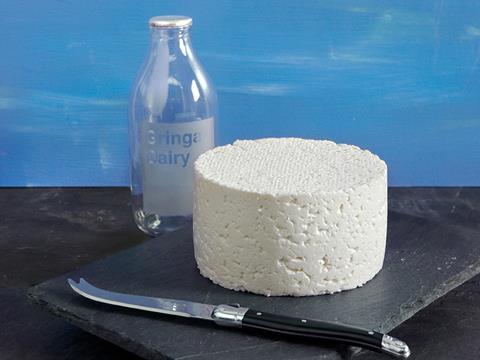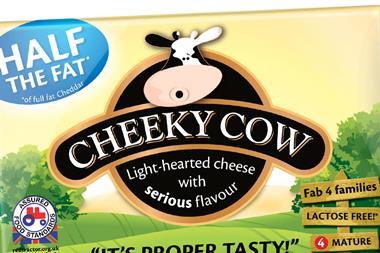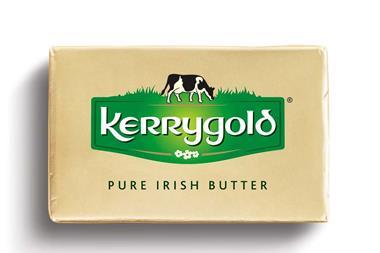
Britain’s membership of the EU may be hanging in the balance but shoppers are giving a unanimous ‘Yes’ vote to the Continent’s cheeses.
The overall UK Continental cheese market is in fine order, with value sales up 3.3% on volumes up 3.5% [Kantar 52 w/e 24 May 2015]. But not all parts of the category are doing equally well: there has been a notable shift from brands, whose value sales are down 7.8%, to own label, up 6.9%.
The overall increase in sales of Continental cheeses has been driven partly by increased familiarity - through TV shows, magazines and through foreign travel - and better accessibility.
Consumers have become comfortable using speciality cheeses for more meals, says Eurilait MD Howard Newmarch. “Cheese naturally lends itself to a quick meal preparation, often replacing meat and adding flavour and texture,” he says.
Austria
Austria is increasingly churning out awardwinning products to compete with the best Europe can offer. Paxton & Whitfield, the 200-year-old British cheesemonger, cites Hubaner - an unpasteurised, traditional rennet cows milk cheese from Austria - as one of its current stars. The Alpine-style, aged hard cheese is made by a modern Austrian co-op creamery near the Swiss and German borders. It uses cows milk from around 30 small farms that each have herds of about 15 cows. The interior of the cheese has little pea-sized ‘eyes’ that are the result of gas the culture produces. The result is a rich and silky cheese with toasted nut flavours and spicy after notes.
The category is dominated by own label, more than two thirds of value and volume, and retailers have been quick to capitalise on shoppers’ growing willingness to explore the category.
“British shoppers feel Continental products are more accessible now and that is coming mainly via own-label deals, which means the risk of purchase is reduced,” says James Prentice, senior brand manager at Arla Foods. “We’re also seeing larger pack sizes starting to come into the fixture, which suggests average weight of purchase is creeping up. Own label has responded quite rapidly to that market demand.”
Continental brands tend to be specific to a type of cheese or origin, which means they’re not as well placed as some own-label brands to stretch across the entire Continental category, adds Prentice.
He points to Arla’s Castello as one of the few brands present across the fixture, with products such as Creamy Blue, Danish Blue and Pineapple Halo. The responsibility therefore falls on brands such as Castello to invest in the category and encourage trial of new products, he says. This summer Castello has been running a campaign inviting consumers to partake in ‘smorging’, derived from smorgasbord. Pop-up Smorg Stations at London train stations encouraging people to try its Continental cheeses. “Brands have a role to play to demystify the category a bit,” says Prentice.

Bel UK is another supplier to have identified the increasing trend for cheeseboards and Continental sharing platters both in and out of home. “Cheese manufacturers and retailers are required to be more creative in their contribution, including blended flavours and limited editions that create a sense of immediacy in the need to purchase,” says Sarah Blackwell, trade marketing manager at Bel, whose stable of brands includes Leerdammer, Boursin and Port Salut.
Mexico
A railway arch in South East London may seem an unusual location for a Mexican dairy, but Gringa Dairy is building a growing base of devoted UK retailers for its artisan cheeses. Historically, Mexican cheese has been rarely available - let alone produced. The range includes fresh, crumbly queso fresco, used in many Mexican dishes; firm, stringy, queso oaxaca; the melting cooking cheese queso chihuahua; and queso luchito, a cream cheese flavoured with Gran Luchito chilli paste.
Capitalising on the current trend for Mexican cuisine, the cheeses have picked up listings in the likes of Selfridges, Whole Foods Market and Fortnum & Mason.
Although most Continental cheeses are showing steady growth, some are outperforming the market. Gouda, with sales up 23.1%, and Emmental, up 16.7%, are now well on the way to becoming mainstream cheeses, according to Hamish Renton, MD of HRA Marketing. “Babybel, for example, is now offering a Gouda variety in its mini format, and The Laughing Cow has an Emmental variety.”
Other suppliers, including Eurilait and Futura Foods, point to the continued growth of halloumi, feta and Italian cheeses such as Parmesan. On the other side of the coin, Edam, with sales down 2.6%, and Gruyère, down 7.3%, are the big losers.
The discounters
One factor that’s undoubtedly changed the face of the Continental cheese market in the UK is Aldi and Lidl growing their own-label assortment and lowering average market prices. The retailers have enjoyed respective value growth of 29.3% and 50.6% in the past year, while the big four’s sales have fallen or remained flat.
Aldi and Lidl may not win on range, says Renton, but consumers assume their range is more authentically European than rivals’. “By covering all bases from Gouda and Emmental to Camembert and offering affordable prices, it is not surprising the discounters are winning.”
Lithuania
The accession of post-Soviet states to the EU since the early 2000s has opened up routes to market for eastern European cheeses. Brands such as Lithuanian cheese Džiugas are finding a market in the UK as an alternative to Swiss products, which have suffered from poor exchange rates between sterling and the Swiss franc. In taste terms Džiugas is positioned as an alternative to mature Edam for consumers seeking something “delicious but different”, according to Bobbi Davy, director of the Clear Group, which represents Džiugas in the UK. The brand has recently launched a line of ‘curated’ grated cheese mixes to complement bakes, pastas, salads or pizzas.
Continental cheese suppliers are also exposed to political and economic upheaval in the EU, whether it’s the removal of dairy quotas, the Eurozone crisis or the turmoil in Greece. “Milk production is expected to rise in coming years, exacerbating global oversupply, which has resulted in historically low prices for farmers,” says Renton. “With more production, added-value products such as cheese will become more important for producers and likely lead to increasing supply. This will lead prices to fall.”
Greek supplies have been relatively unaffected by the country’s problems, says Newmarch, but the squeeze on banking resources has added unwelcome pressure to Greek dairies’ operations. “Fortunately much of the feta has already been made for the year and is in store,” he adds.
Kenneth Axen, MD of Futura Foods, one of the biggest feta importers, adds, however, that a lack of trucks prepared to drive to the country has delayed delivery of certain products.
That Continental cheese sales continue to grow despite such upheaval is testament to the strength of the category. If branded suppliers are able to raise their game, the future will look even brighter.



















No comments yet